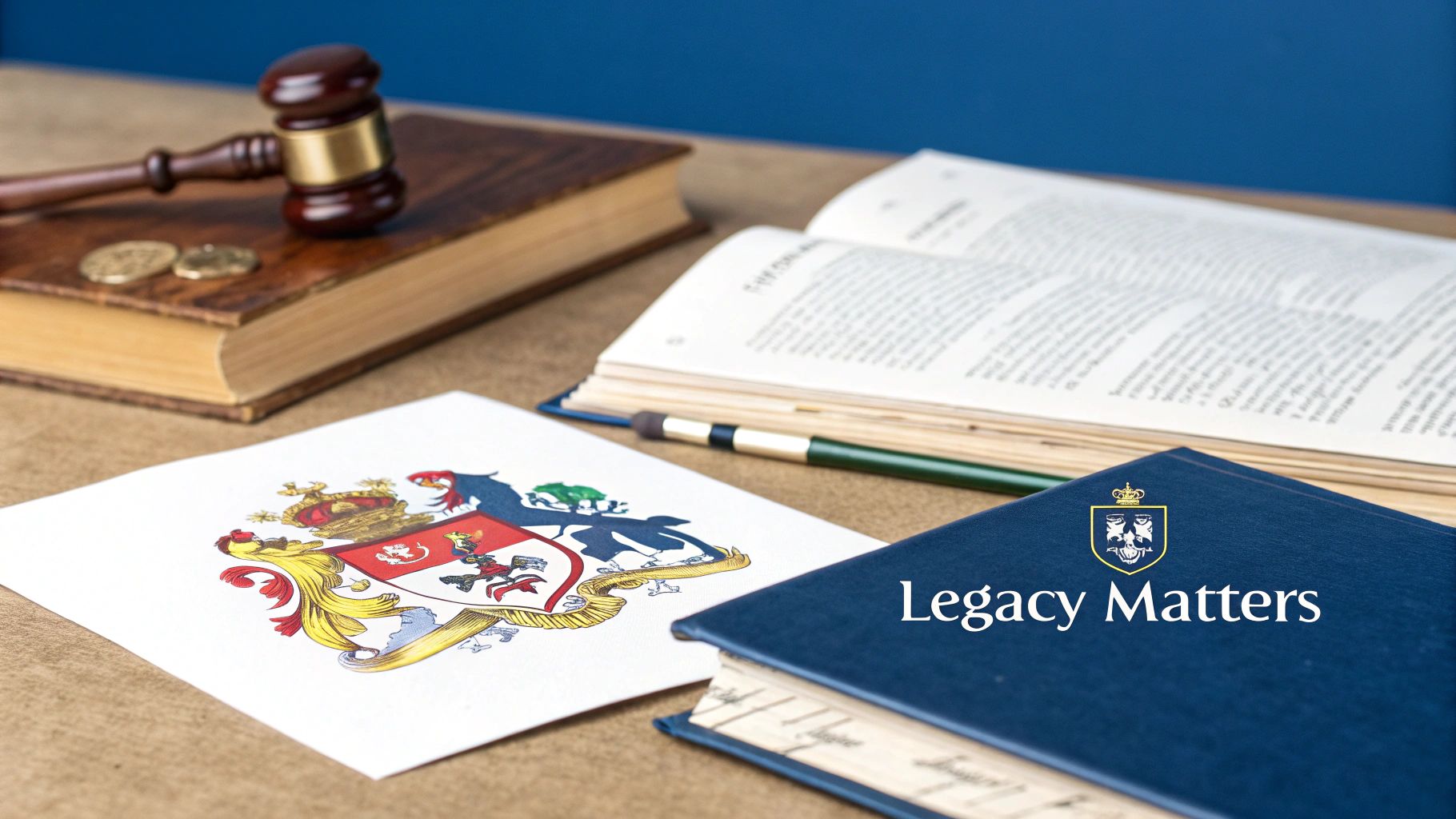Estate Planning for Families: Secure Your Legacy
- dustinjohnson5
- 52 minutes ago
- 11 min read
Why Every Family Needs an Estate Plan (Regardless of Wealth)

Many people mistakenly believe estate planning is only for the wealthy. This is simply not true. Estate planning is essential for every family, no matter their financial situation. It's about ensuring your loved ones are cared for and your wishes are respected.
This provides peace of mind for you and security for your family. Estate planning creates a clear plan for managing and distributing your assets, and outlining healthcare preferences. Surprisingly, many families neglect this vital process.
Only about 32% of Americans had an estate plan in 2024. This is a decrease from previous years, and a similar percentage have essential estate planning documents. Reasons for this lack of planning include lack of awareness, perceived cost, and complexity. This highlights the need for financial literacy and reinforces that estate planning is for everyone. Find more detailed statistics here: Alarming Estate Planning Statistics
Essential Components of a Family Estate Plan
A comprehensive estate plan goes beyond simply writing a will. It involves several key components working together to protect your family. These documents provide a clear roadmap for your loved ones, minimizing potential conflicts, and ensuring a smooth transition, especially during difficult times.
Will: This legal document details how you want your assets distributed after your passing and allows you to name guardians for minor children.
Trusts: Trusts offer a more complex and flexible way to manage and distribute assets, often bypassing the probate process.
Power of Attorney: This designates someone to manage your finances and legal matters if you become incapacitated.
Healthcare Directive (Living Will): This specifies your wishes for medical treatment if you cannot communicate them.
Guardianship Designation: This legally appoints someone to care for your minor children if you're unable to.
Why Estate Planning Matters, Regardless of Wealth
Think of estate planning as a safety net, not a luxury. Even without significant wealth, a plan is vital. It ensures your children are cared for by your chosen guardians and minimizes potential family disputes over assets, regardless of their size. This is particularly important in blended families or complex family dynamics.
Benefits of a Well-Defined Plan
A well-defined estate plan provides significant advantages:
Minimizing Family Conflicts: Clear instructions about your wishes can prevent disagreements and legal battles.
Protecting Vulnerable Family Members: This safeguards the well-being of minor children, individuals with special needs, or elderly parents.
Ensuring Your Legacy: An estate plan allows you to control how your assets are used and distributed, reflecting your values and intentions.
Ultimately, estate planning is about securing your family's future and providing peace of mind. It's a gift of clarity and security beyond monetary value.
Estate Planning Milestones: Protection at Every Family Stage

Just as your family grows and changes over time, so should your estate plan. It's not a one-time task, but an ongoing process that adapts to life's milestones. This means creating a flexible plan that can adjust to different family stages, from young children to expanding businesses and beyond.
Protecting Young Families: Foundational Steps
For young families, guardianship and basic asset protection are often top priorities. This stage focuses on ensuring the children's well-being if something were to happen to the parents. A will is essential for naming guardians and outlining how assets will be distributed.
Establishing a power of attorney is also vital. This designates someone to manage finances if the parents become incapacitated. These foundational steps offer a safety net and peace of mind during the demanding years of raising a young family.
Mid-Life Families: Balancing Growth and Protection
As families grow, estate planning becomes more intricate. Balancing college savings with retirement planning and wealth preservation becomes crucial. This is an opportune time to consider a revocable living trust.
This type of trust bypasses the often lengthy probate process, keeping family matters private and efficient. Exploring tax-advantaged college savings plans, like 529 plans, also becomes critical for minimizing future tax burdens.
Multi-Generational Families: Legacy and Succession
Multi-generational families often focus on preserving wealth across generations and ensuring smooth business transitions. Strategic tax planning becomes even more important to minimize estate taxes and maximize inheritance.
Tools like irrevocable trusts and family limited partnerships can offer significant tax advantages while safeguarding assets. Business succession planning ensures the continued prosperity of family-owned businesses, transferring ownership efficiently and preserving the family legacy. This planning often involves considering the tax implications of inheritance and long-term business goals.
To illustrate the varying priorities at each stage, consider the following table:
Estate Planning Priorities by Family Life Stage This table outlines the essential estate planning documents and considerations for families at different life stages
Life Stage | Essential Documents | Key Considerations | Recommended Review Frequency |
|---|---|---|---|
Young Family | Will, Power of Attorney | Guardianship, Basic Asset Protection | Every 2-3 Years |
Mid-Life Family | Will, Power of Attorney, Revocable Living Trust | College Savings, Retirement Planning, Wealth Preservation | Every 3-5 Years |
Multi-Generational Family | Will, Power of Attorney, Irrevocable Trust, Family Limited Partnership | Estate Tax Minimization, Business Succession Planning, Legacy Preservation | Every 5 Years or with Major Life Events |
This table summarizes key estate planning needs at different life stages. Regular reviews and updates ensure your plan remains aligned with your family's evolving circumstances. Interestingly, age significantly influences estate planning. By 72, 81% of individuals have a will, compared to just 24% of those aged 18-34. This highlights the importance of planning earlier. Learn more: Estate Planning Statistics
Actionable Recommendations for Each Stage
Each family stage requires specific planning actions. Young families should prioritize discussions about guardianship and draft a will. Mid-life families should review insurance coverage, explore trust options, and begin college savings strategies.
Multi-generational families should engage in advanced tax planning and develop robust business succession plans. By understanding the unique needs of each stage and implementing appropriate strategies, families can ensure their loved ones are protected and their legacy is secured. This proactive approach provides peace of mind and builds a lasting foundation for future generations.
Wills vs. Trusts: Choosing Your Family's Protection Blueprint

Estate planning is a cornerstone of financial security, and within this domain, wills and trusts play crucial roles. These legal instruments work together to create a comprehensive safety net for your family. Understanding their distinct functions empowers you to make informed decisions that align with your unique needs.
Understanding Wills
A will is a foundational document in estate planning. It dictates how your assets will be distributed after you pass away and allows you to designate guardians for any minor children. However, wills are subject to probate, a court-supervised process that validates the will and oversees the distribution of assets.
This process can be both time-consuming and expensive, often lasting months or even years. Furthermore, probate proceedings become part of the public record, potentially exposing your family's financial matters to unwanted scrutiny.
Exploring Trusts: An Alternative Approach
Trusts offer a different approach with increased flexibility and control over asset distribution. A trust is a legal agreement in which a trustee holds and manages assets for the benefit of designated beneficiaries. Many families choose revocable living trusts for their estate planning needs.
This type of trust bypasses probate altogether, keeping the distribution of assets private and streamlined. This can potentially save your family significant legal fees and considerably reduce the time required for asset transfer.
Different Trust Structures for Varying Needs
Trusts are not a one-size-fits-all solution. Several types of trusts exist, each designed to address specific family circumstances. Special needs trusts, for example, protect vulnerable family members without impacting their eligibility for government benefits.
Educational trusts facilitate college savings, ensuring funds are available for education without incurring unnecessary tax liabilities. Irrevocable trusts, unlike revocable trusts, cannot be modified after they are established. They offer advantages such as asset protection from creditors and potential estate tax benefits.
Understanding the Key Differences: Wills vs. Trusts
To illustrate the key distinctions between wills and trusts, let's examine the following comparison table:
Wills vs. Trusts Comparison for Families
A comprehensive comparison of wills and trusts highlighting key differences in terms of probate, privacy, control, and costs
Feature | Will | Living Trust | Best For |
|---|---|---|---|
Probate | Required | Avoided | Families wishing to avoid court proceedings and maintain privacy |
Privacy | Public Record | Private | Families concerned about privacy |
Control | Less control after death | More control even after death | Individuals desiring greater control over asset distribution |
Cost | Generally less expensive to create | More expensive to create, but potentially saves on probate costs | Varies based on family needs and complexity of assets |
Choosing the Right Blueprint: Simpler vs. Sophisticated
For families with straightforward estates, a basic will may suffice. However, for families with substantial wealth or more complex situations, such as blended families or children with special needs, a more sophisticated plan involving trusts may be necessary.
Choosing the right approach requires careful consideration of your family's specific circumstances and financial goals. For those seeking to avoid probate and ensure a smooth transition of assets, a trust-based estate plan offers significant advantages. Consulting with an experienced estate planning professional, like those at America First Financial, can provide personalized guidance. They can help you navigate the complexities of wills and trusts, ensuring your estate plan aligns with your values and objectives.
Protecting What Matters Most: Guardianship Planning Essentials

When planning for your family's future, deciding who will care for your minor children if you can't is paramount. This is the essence of guardianship planning. It's a crucial step that safeguards your children's well-being and helps avoid potential family conflicts and legal battles down the line.
Selecting The Right Guardian: Key Considerations
Choosing the right guardian isn't a decision to be taken lightly. Think about who shares your core values and parenting style. A stable and loving home environment is essential.
Also consider the potential guardian's financial security and their capacity to take on the responsibility of raising children. The goal is to ensure your children not just survive, but thrive.
Documenting Your Choices: Legal Requirements
After selecting a guardian, formalize your decision legally. This typically means naming your chosen guardian in your will. A will is a legally binding document that expresses your wishes. This official documentation helps prevent disputes among family members regarding your children's care.
Open and honest communication with your chosen guardian is crucial. Discuss your expectations, values, and parenting philosophy to ensure everyone is on the same page.
Financial Structures For Your Children's Future
Guardianship is just one piece of the puzzle. You also need to think about your children's financial future. Setting up a trust can be an effective way to manage their inheritance.
A trust allows you to dictate how and when funds are disbursed. This ensures your children's needs are met as they grow, covering expenses like education, healthcare, and general well-being. This controlled distribution also protects the inheritance from potential mismanagement. Interestingly, estate planning prevalence correlates with wealth. 77% of individuals with a net worth exceeding $1 million have an estate plan, compared to 36% of those with less than $1 million. For more insights, explore these Estate Planning Statistics and Facts.
Addressing Unique Family Situations
Every family is different, and guardianship planning should reflect that. Blended families may have unique dynamics to consider. Open communication and acknowledging the children's relationships with all family members are key.
Children with special needs require guardians who understand and can meet their unique requirements. Long-term care and support planning become even more critical in these situations.
Practical Approaches To Guardianship Planning
Provide detailed care instructions for your children. Include information on education, religious upbringing, extracurricular activities, and medical preferences. This ensures continuity in their lives, reflecting your wishes even in your absence.
Regularly review and update your guardianship plan, especially after major life events like marriage, divorce, or the birth of a child. Keeping your plan current ensures it remains relevant to your family’s situation.
Consulting with an estate planning professional, such as those at America First Financial, is highly recommended. They can provide expert guidance on selecting guardians, establishing trusts, and addressing any unique needs your family may have.
Strategic Tax Planning: Preserving Your Family's Wealth
Estate planning is more than just deciding how your assets will be distributed. It's a crucial tool for minimizing taxes and maximizing the inheritance passed on to your loved ones. Strategic tax planning within your estate plan allows you to effectively use tax laws to preserve your family's wealth. This involves understanding current tax exemptions, anticipating potential future changes in tax law, and implementing strategies that reduce your tax liabilities.
Leveraging Gifting Strategies and Step-Up in Basis
One effective strategy is using annual gifting. This allows you to transfer wealth to family members without incurring gift tax. The current annual gift tax exclusion is $17,000 per recipient (2023). This means you can gift up to this amount to any number of individuals each year, completely tax-free.
Another key concept is the step-up in basis. This adjusts the cost basis of inherited assets to their market value at the time of the owner's death. This can save heirs significant money on capital gains taxes, especially if the assets have appreciated considerably over time. It’s a particularly useful tool for transferring assets like real estate or stock portfolios.
Charitable Trusts and Qualified Personal Residence Trusts
Charitable remainder trusts (CRTs) offer a way to support your chosen charities while also receiving tax benefits. These trusts provide income to beneficiaries for a set period, with the remaining assets ultimately going to a designated charity. This benefits both your family and the organizations you wish to support.
Protecting your home from estate taxes is also an important consideration. A qualified personal residence trust (QPRT) can remove your home from your taxable estate, potentially saving a substantial sum in estate taxes. This is particularly advantageous for families with high-value homes.
Family Limited Partnerships and Business Succession
For families who own businesses, family limited partnerships (FLPs) offer a way to transfer ownership while minimizing gift and estate taxes. These partnerships provide a structured approach to business succession planning, facilitating a smooth transition of ownership and control to the next generation. This helps maintain family control and streamlines the succession process. FLPs can also offer valuation discounts, further reducing the taxable value of the business.
Practical Implementation and Timelines
Putting these strategies into action requires careful planning and collaboration with a qualified estate planning professional, such as those at America First Financial. They can help create a personalized plan that aligns with your family's financial goals and risk tolerance. Timelines for implementation vary, but it's always wise to start early and review your plan periodically, especially as tax laws change and your family's circumstances evolve. This proactive approach allows you to maximize tax savings and secure your family’s financial future. They can also guide you through the complexities of estate tax law and develop a plan tailored to your specific needs.
Creating a Family Legacy That Transcends Financial Assets
Estate planning often revolves around the financial—wills, trusts, and minimizing taxes. But a truly effective plan considers the non-financial legacy you'll leave: your values, wisdom, and memories. This means looking beyond monetary wealth to how you can pass on intangible assets that will shape future generations.
Sharing Life Lessons and Values: Ethical Wills and Legacy Letters
While a will dictates asset distribution, an ethical will or legacy letter focuses on sharing life lessons, values, and hopes for your family’s future. These documents allow you to express love, offer guidance, and impart wisdom that goes beyond monetary value. You might share stories of overcoming challenges, express gratitude for loved ones, or offer advice on navigating life's complexities.
These personal expressions become cherished heirlooms, offering comfort and inspiration for generations to come. They create a unique connection with future generations on a deeper, more personal level.
Aligning Charitable Giving with Family Values
Estate planning presents an opportunity to align charitable giving with your family's core values. Tools like donor-advised funds, charitable trusts, and family foundations provide ways to involve multiple generations in philanthropy. This can foster a shared sense of purpose and instill a tradition of giving back. Additionally, understanding the potential tax implications of nursing home expenses is important during estate planning.
By involving younger family members in charitable decisions, you teach them about the importance of philanthropy and empower them to make a positive impact.
Preserving Family Memories: Digital Legacy Planning
Digital legacy planning is increasingly important. This involves organizing and preserving digital assets like photos, videos, and online accounts. These digital memories can be curated and shared with family, ensuring irreplaceable moments aren't lost.
Recorded interviews, family recipes, and thoughtfully written stories also become treasured inheritances, preserving family history and traditions.
Family Businesses: Vehicles for Transmitting Values
Family businesses often represent more than just income. They embody family values, traditions, and a history of hard work. Estate planning helps ensure the successful transition of these businesses to the next generation, preserving both financial and emotional legacies.
A well-crafted succession plan ensures not only the business's continued prosperity but also the transmission of family values and entrepreneurial spirit. This creates a powerful sense of continuity and shared purpose across generations. These plans should consider the financial aspects of the business as well as the intangible values that have contributed to its success.
By incorporating these elements, your estate plan becomes more than a legal document; it becomes a powerful expression of your love, values, and hopes for your family’s future. It’s a roadmap for creating a legacy that transcends financial wealth.
Ready to create a legacy that reflects your values and protects your family’s future? Contact America First Financial today for a personalized consultation. Our experienced professionals can help you develop a comprehensive estate plan that addresses your family's unique needs.
_edited.png)